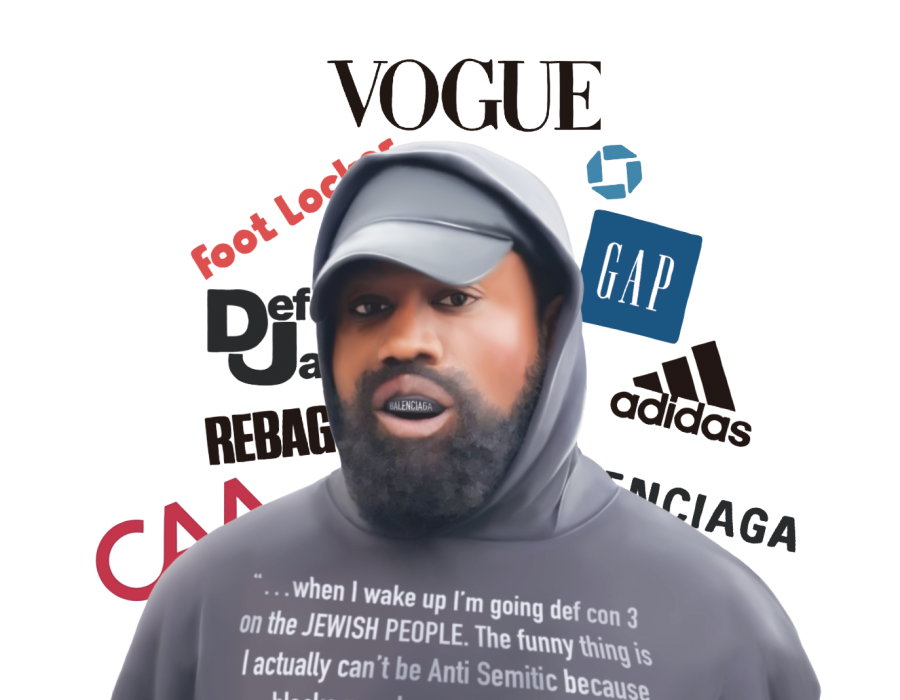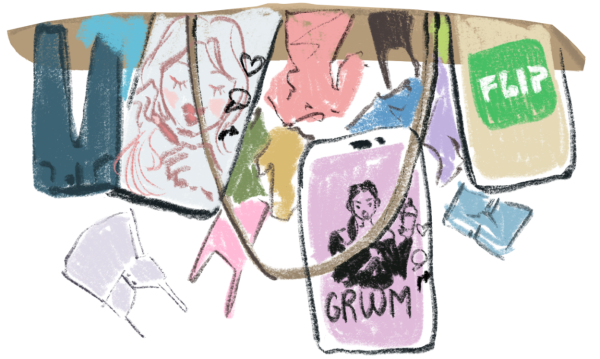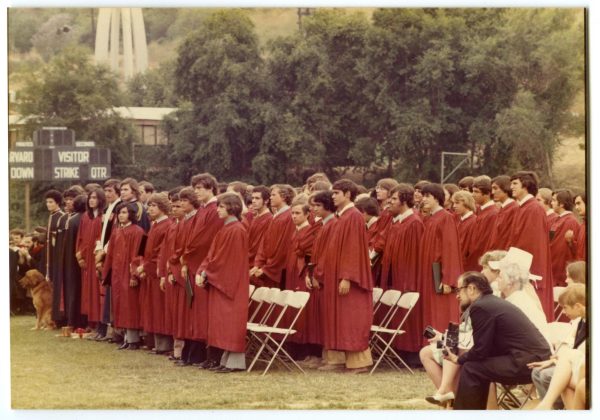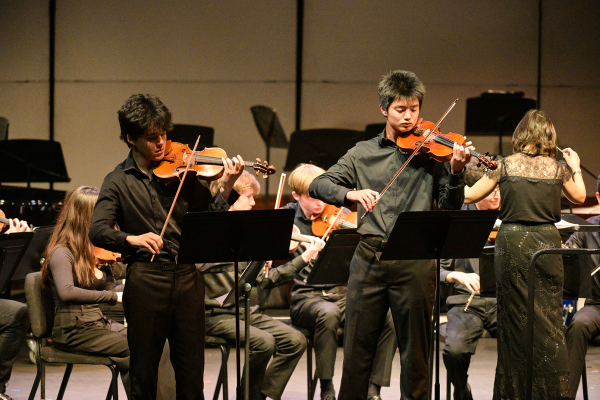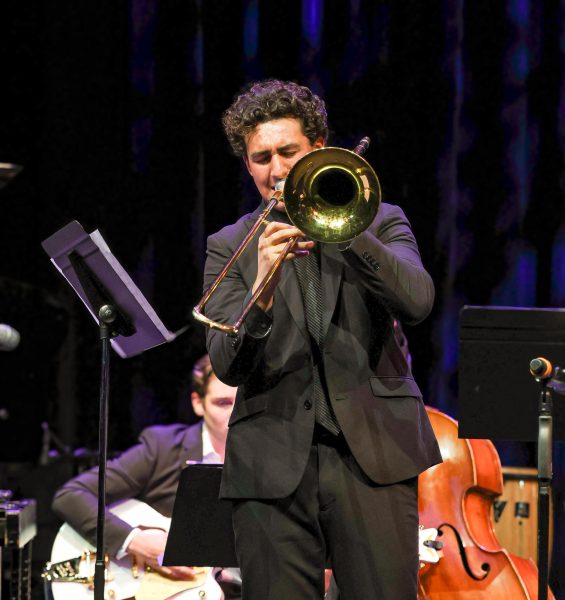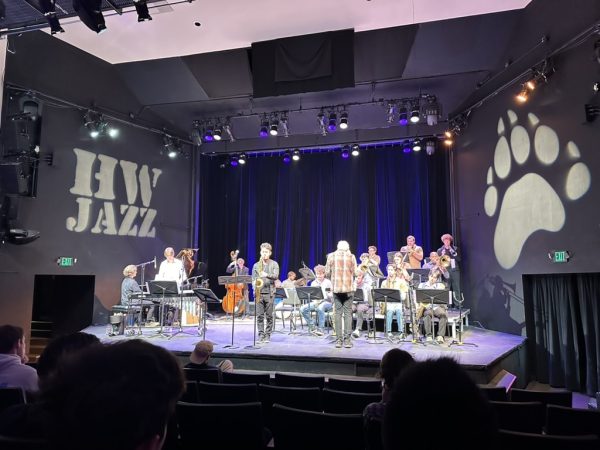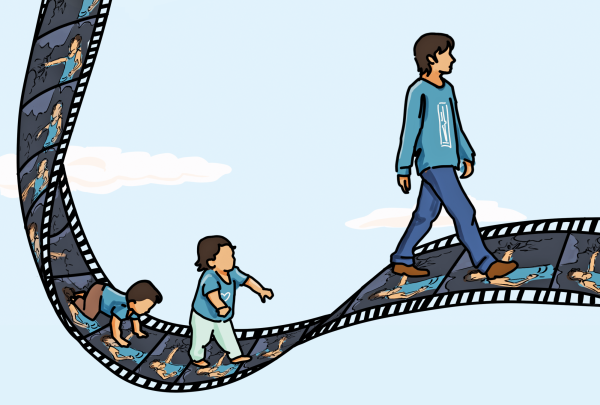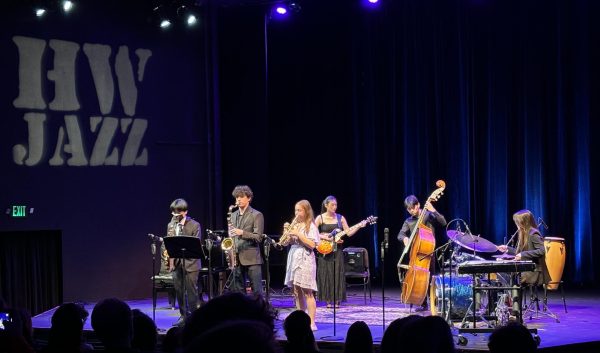Separating the Art from the Artist: Ye or Nay?
Illustrations by Sophia Evans and Mejo Liao
Following his anti-Semitic remarks on Twitter, Ye has lost brand deals with Adidas, Chase Bank, Gap and Balenciaga, among others. He has been locked out of social media platforms, including Twitter and Instagram, as well.
November 16, 2022
Scrolling on her phone, Jewish Club Leader Charlotte Newman ’24 said she was disappointed to see a Jewish activist share anti-Semitic remarks that American rapper, songwriter and record producer Ye, born Kanye West, had posted on Twitter. Newman said though she found Ye’s remarks difficult to grasp at first, she did not find it disturbing given the global rise of anti-Semitism.
“The initial post struck me as weird,” Newman said. “I did not know what [death con three] meant at first. I was pretty unfazed, though, because to some degree, a lot of celebrities and people [have] voiced their anti-Semitic beliefs on Twitter.”
After Ye posted a threat to murder Jewish people, multiple brands, including Adidas, Chase Bank, Gap, Balenciaga and his record label CAA terminated brand deals with him. In addition, social media platforms including Twitter and Instagram have deleted his accounts.
Newman said though Ye has made numerous controversial remarks in the past, she finds his anti-Semitism hurtful in particular.
“I liked Kanye,” Newman said. “I was never a huge fan, but I liked his music. His opinions have, for some time, struck me as egotistical, [but] I think his comments toward Jewish people are more harmful than past comments [he has made] because of what he said at this particular moment about Jewish people. He is still a great musician, but I am not purchasing merchandise, tickets or playing his songs on repeat.”
Like Newman, Upper School Visual Arts Teacher and DEI Coordinator Reb Limerick said Ye’s remarks against Jewish people have prompted them to stop listening to his music.
“Ye has gradually shifted from being a problematic favorite to someone [that] I no longer admire or support,” Limerick said. “His music is intertwined with ecstatic and special memories with friends, but at some point, I had to let him go and draw the line.”
Jewish Club Leader Manu Markman ’23 said Ye’s threats are concerning because they signal a larger disregard for the Jewish community.
“I was disappointed knowing that he is symbolic of a greater ignorance of the past Jewish experience that has subjected us to unthinkable alienation in Europe and around the world,” Markman said. “When I saw Kanye’s posts, I felt it was less about Kanye, who has been upfront about his mental health struggles, and more about the greater importance we should ascribe to education on the Jewish experience.”
Markman said he still believes being able to separate art from the artist is valuable because it allows people to appreciate art without connecting it to its creator’s mistakes.
“I think one must respect the value of a product, even if the producer is flawed,” Markman said. “If I like a product, I will continue to interact with the product while keeping in mind that I do not support what the producer has done. I think that is a valuable mindset to have because it allows for nuance and an appreciation that bad people can make or do great things like Lyndon B. Johnson and the Civil Rights Act, for instance.”
Whether individuals should support a product when its creator is embroiled in controversies — that is, separate the art from the artist — has been mainstream for some time. Though some find it difficult to support an artist following these controversies, others, like Sam Pulaski ’24, said they find this less process challenging.
Pulaski said though he recognizes that what Ye did was wrong, he will have a difficult time detaching himself from Ye’s music.
“I do not want to support him, but at the same time, I love his music, and I find it difficult to stop listening to his music,” Pulaski said. “He has either written, produced or vocalized in a good portion of music from the last 20 years. There is a playlist on Spotify with every single song that he has spoken at least one word on, and that playlist has 500 songs. It is 25 hours long. To not listen to all that music can be a challenge.”
Aviv Pilipski ’25 echoed a similar sentiment. Pilipski said he will continue to listen to Ye’s music, though his feelings toward him have changed. He said there is an important distinction to make between active and passive forms of support.
“I am going to listen to his music, but as a person, my feelings toward him have shifted for the [worse],” Pilipski said. “The events have me thinking twice about listening to his music but are not enough to prevent me. If his music was on somewhere, I would not walk out or storm out of the room. I consider listening to his music a passive action. I feel the line gets drawn when the action becomes active like when people purchase merchandise or decide to go to his concerts.”
Pilipski said part of this decision is because he views the freedom of expression as an important aspect of his Jewish culture.
“Freedom of speech is a Jewish value,” Pilipski said. “Freedom of speech is what allowed Jewish civilizations to survive and what allows my faith to continue. I do not want to censor anyone or force anyone to have anti-Semitic training or background because that goes against my own values. For me, what people believe is what they believe. I want to educate them, but when celebrities say something, I feel that it is not my place to judge them. I think context is important, and I want to dig in a little more to see the context surrounding their actions. I do not hate them without considering these circumstances.”
Limerick said it is important to give artists chances to make up for their past mistakes, though their actions become unacceptable when similar offenses continue.
“I do not believe we should rush to cancel an artist for doing something wrong because people should be given opportunities to grow and change, but we must notice who our culture gives second, third or tenth chances to and who we do not,” Limerick said. “Once I notice patterns of harm, hate and abuse of power, then it is time to stop supporting an artist with my money and time.”
Ye, however, is not alone in conversations about separating the art from the artist. British author and philanthropist J. K. Rowling, best known for writing the “Harry Potter” series, has been subject to allegations of transphobia and homophobia as well.
Harry Potter Club Leader Jessica Thompson ’23 said she was disappointed in Rowling’s offensive remarks toward the LGBTQ community.
“I watched Harry Potter as I grew up as other kids watched Star Wars and other shows,” Thompson said. “I read all the books in elementary school, and when COVID-19 hit, I rewatched all the movies and reread the books. When all of the stuff [regarding her transphobia] transpired, I tried to not support the Harry Potter franchise. I did not purchase things from Universal [Studios] or the website. I bought books second-hand and watched the movies pirated. I did not want the money I spent to be given to J. K. Rowling.”
Thompson said celebrating the “Harry Potter” series without benefiting Rowling has been difficult because of her attachment to the movies.
“It is super difficult to be able to separate the art from the artist, but I have tried to remember the movies [and books] as their own entities, celebrating the series without celebrating J. K. Rowling,” Thompson said. “I do not align with her morals at all [given that] she is transphobic and has, at times, been a little homophobic as well. I do not support her in any way, shape or form.”
Thompson said the Harry Potter Club has to get creative to celebrate customs from the books without benefiting Rowling.
“[In] the Harry Potter Club, we do activities based on the books,” Thompson said. “We are planning to do a Quidditch tournament, and we have made butter beer in the past. But, we are not going to the sites or buying the books firsthand. We are trying to do stuff from the books rather than going straight to the source.”
Thompson said the decision to support an artist despite their past faults is an individual’s choice.
“It is difficult and different for each situation,” Thompson said. “We need to distance ourselves from both the art and the artist in drastic circumstances when the artists themselves have super profane views, but in some situations, I think it is okay. I think it is different for each person depending on their connection to the art as well. If someone has a personal connection to the art, it is going to be difficult to separate themselves from it.”
Pilipski said it is important to consider a variety of circumstances when making the decision to separate the art from the artist.
“It is tied to personal ethics, morals and values,” Pilipski said. “To make that decision is a culmination of many things, including one’s religious or nonreligious cultural background and how one was raised. There are a lot of factors that go into making such a decision. I do not know if I can generalize it, and I think it is difficult because it is such a personal choice.”
Pilipski said although some can choose to distinguish a product from its producer, offenses made by the artist should not be overlooked.
“I do not believe that an artist can say whatever they want without facing repercussions,” Pilipski said. “I think there should be repercussions, and there should be conversation, but in this distinction between the art and the artist, I think there is some value and validity in separating the two.”































